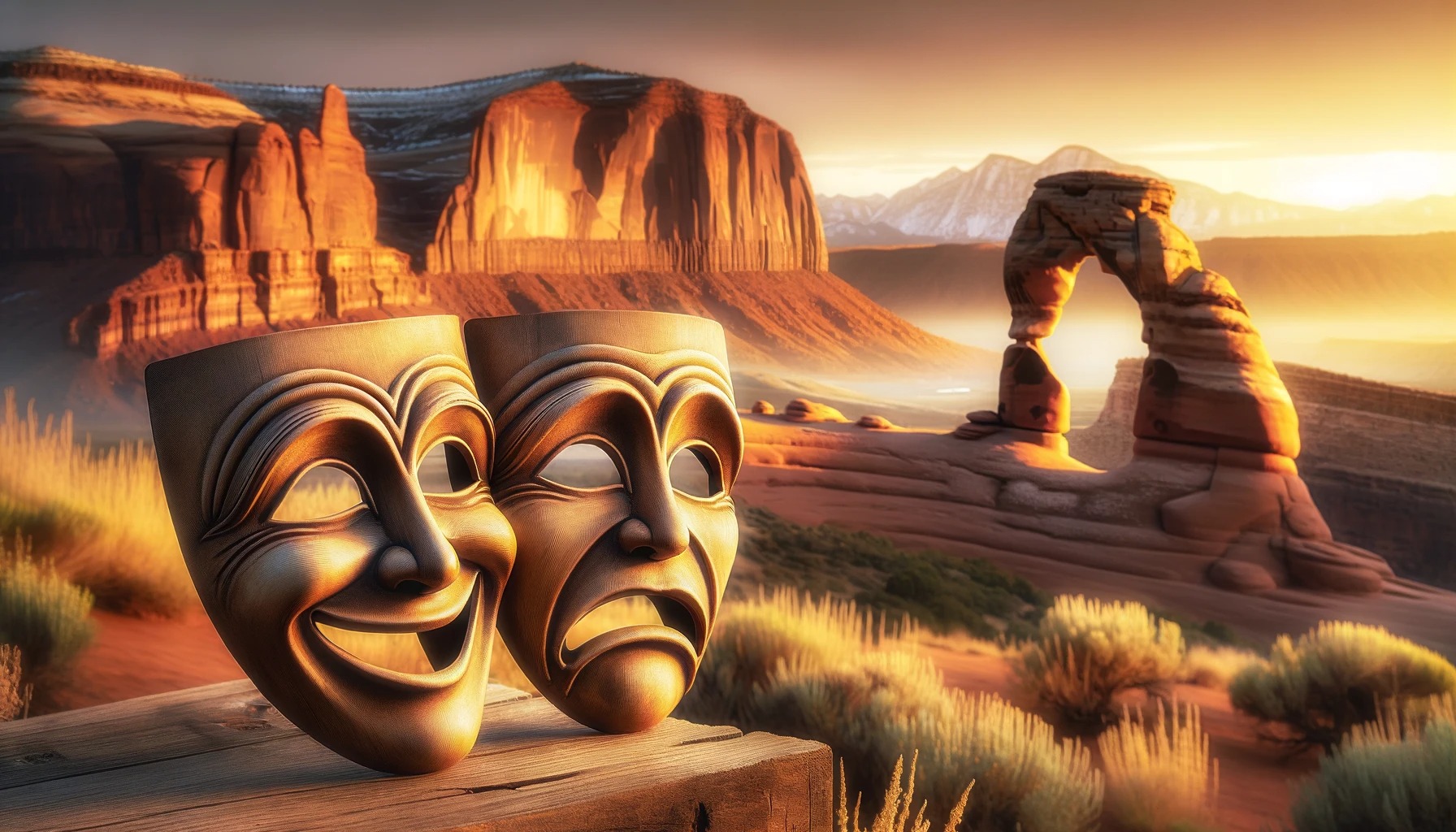SALT LAKE CITY – The Doomsday Device by Nicholas Dunn at Westminister College is now being brought to life by director Sammee Jackman. When entering the auditorium, the first thing to notice is the elaborate set designed by Maddie Keil; upon entering theatre there is sand strewn on the floor with pieces of burlap material hanging on the walls. The rest of the space had sand everywhere and was littered with what looked like garbage and debris. This led to a dystopian sense for the play.
Not unlike Ocean Filibuster, the play is an examination of technology’s impact on humans but is more reminiscent of films like The Matrix or Terminator, so there’s not a lot that’s new here if you’re familiar with apocalypse by machine/technology type stories. But the devil’s in the details as the play starts off with Theo (played by Percy Cordero) and Jule (played by Karina Barnes), who are struggling to survive in the aftermath of humanity’s collapse. The play opens in total darkness as Jule comes out to use the microwave, as the light from the “cooking box” is the only light in the room. The audience listens to the familiar hum of a microwave. Since the world ended through the various machinations of technology and the internet, light is an on-going motif throughout the performance.
As Theo tinkers with the extension cords, trying to get the VCR (and later TV) to work, there are tall lights off to each side of the stage that are turned on and off with a small sound effect as he redirects “the energy”. The lighting effects, designed by Spencer Brown, are employed readily throughout the play – there is a moment, as dawn is approaching, where there are lights on the ground as if the sun is peering through openings in a ceiling. Later on, Summer (played by Scott DSG) and Winter (played by Olivia Solomone-Hala’eua) are talking about stealing Theo’s hideout and there are three circular beams of yellow light that the characters stand under which gave an ominous look to them. And during the scene when the cast get to watch Die Hard, the lights are turned off and the TV is facing the actors as light emits and the opening credits start to play. Additionally, when there are flashbacks of Old Gran (played by Trinity Medina), she’s off to the side, under a single spotlight, as she offers wisdom and talks to Jule and Theo about the time before.
The Doomsday Device feels like a play built for millennial nostalgia; Jule tries to figure out what VCR means, they watch Die Hard on VHS left inside of a Blockbuster case and they have a copy of Harry Potter and The Half Blood Prince in their collection of books. And not unlike the film The Book of Eli, the question of literacy is brought up multiple times throughout the play. Although the script suggests that they’ve read The Bible (and other technical texts), Jule can’t pronounce Detroit or National Geographic. But when they meet Lost (played by Todd Hamlett), he is seemingly illiterate as are the vagrants Summer, Winter and their silent crew (played by Cleo Walker and Trinity Medina). In fact, Summer makes a big deal out of burning books for the fire as he sees no reason to learn how to read, so there is no real use for books. The concept of literacy in a post apocalyptic age is intriguing and not generally explored in fiction, so it was refreshing to see it depicted so directly in the play.
Although the marauders (who broke in, trying to escape the storm) had no interest in reading, Jule took great interest in Summer as he began to tap his fingers on the drum, who didn’t know what music was. The use of sound – designed by Zack Nielson and Griffin Irish – is also subtle in the play. There’s a buzzing noise whenever Theo shocks himself, static from the TV when it’s turned on, as Summer explains how the world came to an end one of the marauders is drumming in the background and a gentle lullaby type song plays whenever Old Gran appears. Another pop culture reference feels relevant here as the marauders reminded me of the Greyjoys from Game of Thrones (“we do not sow, we only reap”) as Summer explains how the other thing that’s important is being bigger, stronger and faster than everyone else.
The question of technology’s impact and allusions to how the world may have ended are circled but never answered perhaps to maintain the assertion that no one will ever know what happened; Old Gran talks about how only insects are left, Summer claims there was a Machine God that ended the world, major cities like Detroit are underwater, etc. It’s implied that excess and technology played a hand, but in what way isn’t clear and how it led to everything else that happened isn’t answered.
While The Doomsday Device addresses technology as a force that can both empower and destroy, it can’t learn from the past because the time before is unknown to everyone still alive and so it settles on this idea that technology is power. Unlike Ocean Filibuster, which actively encourages audiences to reject technological innovation due to its destructive force, The Doomsday Device prefers the comforts of the cooking box, electricity and movies on VHS even at the end of the world. It feels more nostalgic versus a comment on today’s society, but any play that calls Jesus a wizard is worth seeing.
[box]The Doomsday Device played March 28 to 30th and again on April 4th to 6th 2024 at 7:30 PM at the Performing Arts Center on the campus of Westminster University. Tickets are $0-15. For more information, visit https://westminsteru.edu/student-life/events-and-performances/performing

-arts-events/index.html.[/box]
